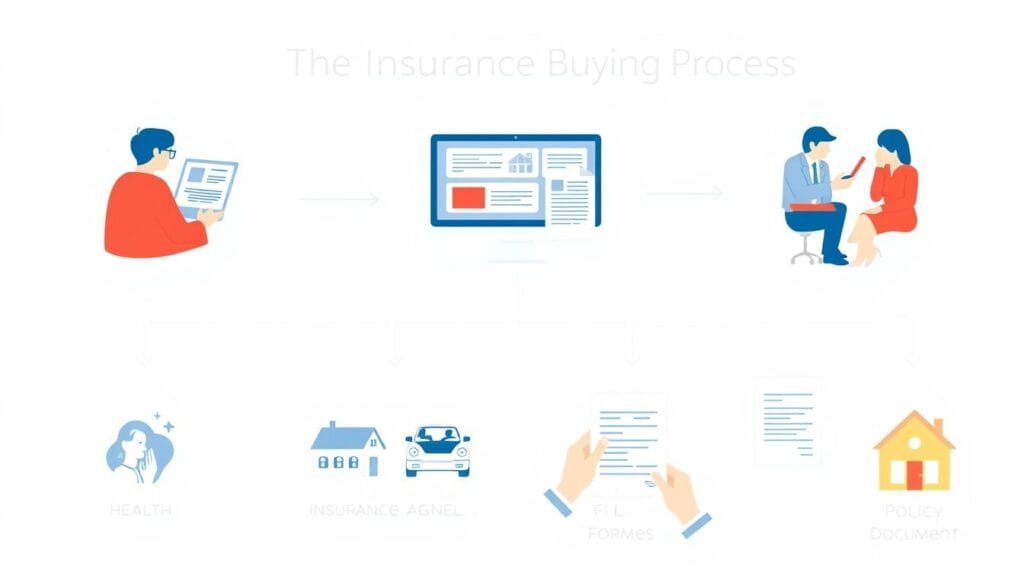In today’s unpredictable world, understanding insurance policies is key for everyone. These policies act as a financial safety net. They protect us from sudden losses that could harm our financial health. With the insurance industry taking in over $1 trillion yearly, knowing the ins and outs of insurance coverage is important. This insurance guide will help you understand the different types of policies. You'll learn how to assess risks and pick the right coverage for your needs.
Key Takeaways
- Insurance policies provide essential financial protection against unexpected events.
- Understanding different types of insurance is crucial for making informed decisions.
- Evaluating policy components helps in selecting suitable coverage.
- The insurance industry plays a significant role in the U.S. economy.
- Informed choices can mitigate risks effectively.
What are Insurance Policies?
Insurance policies are key agreements that help protect people and businesses from unexpected financial losses. Knowing what are insurance policies allows individuals to choose their coverage wisely. Each policy lists detailed terms like coverage scope, exceptions, and advantages.
Definition of Insurance Policies
The term insurance policy definition describes a legal agreement between an insurance company and the policyholder. It details both sides' responsibilities, the coverage amount, and the payment for the premium. Though policies can vary, their main goal is to reduce risk and offer financial stability in tough times.
Types of Insurance Policies
There are many types of insurance to fit different needs. It's crucial to understand these kinds to pick the best policy. Key types include:
- Life Insurance: Provides support to beneficiaries after the policyholder dies.
- Health Insurance: Pays for medical costs and healthcare services.
- Auto Insurance: Offers protection for things linked to owning and using a vehicle.
- Property Insurance: Keeps homes and personal items safe from harm or theft.
| Type of Insurance | Purpose | Key Features |
|---|---|---|
| Life Insurance | Financial protection for beneficiaries | Premiums, death benefits, cash value |
| Health Insurance | Covers medical expenses | Co-pays, deductibles, coverage limits |
| Auto Insurance | Protection against vehicle-related incidents | Liability, collision, comprehensive coverage |
| Property Insurance | Protects personal property | Coverage for theft, fire, and other damages |
Key Components of Insurance Policies
It's important to know what makes up insurance policies. Every part is key to getting the right protection. We'll look at premiums, deductibles, and policy limits. They help you understand what you need from your insurance.
Premiums and Coverage
Premiums are what you pay to keep your insurance. They change based on things like age or health. It’s crucial to see how premiums impact the coverage you get. Paying more usually means getting more protection. Choosing the right plan means looking at these details.
Deductibles and Copayments
Deductibles are what you pay before insurance starts covering. Sometimes, you'll also have copayments for certain services. Knowing these parts of your policy readies you for any costs. This knowledge is vital.
Policy Limits and Exclusions
Policy limits cap what your insurer pays for loss. Knowing them helps you dodge under-coverage. Exclusions are what the policy doesn't cover. They can leave you unprotected in some cases. Knowing both helps avoid surprise costs.
| Component | Description | Impact on Coverage |
|---|---|---|
| Premiums | Fees paid to maintain coverage | Higher premiums generally lead to better coverage |
| Deductibles | Out-of-pocket costs before coverage applies | Higher deductibles lower premiums but increase personal costs |
| Policy Limits | Maximum payout the insurer will provide | Limits that may lead to insufficient coverage |
| Exclusions | Events not covered under the policy | Can create gaps in financial protection |
Understanding Insurance Policies: Coverage Options Explained
Insurance policies come with various coverage options. They protect individuals and businesses from different risks. Knowing about these options helps you choose the best policy for your needs. Let's look at the main types of coverage in insurance policies.
Liability Coverage
Liability coverage is key in protecting from claims by others. It covers costs for bodily harm or property damage caused by the insured. For example, if someone gets hurt on your property, this coverage helps pay their medical bills and legal costs. It shields your finances from unexpected claims.
Property Coverage
Property coverage protects your assets from threats like theft, fire, or natural disasters. It covers homes, belongings, or business properties. This helps you recover from losses without major financial trouble. Knowing your property coverage options lets you set proper limits and add endorsements for full protection.
Personal Injury Coverage
Personal injury insurance covers claims from non-physical harms such as defamation or emotional distress. It's vital for professionals or businesses possibly harming someone's reputation or emotional state. This insurance guards against costly legal fights and claims, offering peace of mind.

| Coverage Type | Key Features | Importance |
|---|---|---|
| Liability Coverage | Covers claims for bodily injury or property damage. | Protects against financial loss from legal claims. |
| Property Coverage | Safeguards physical assets from theft and damage. | Ensures recovery from loss without severe financial strain. |
| Personal Injury Coverage | Protects against claims for non-physical injuries. | Prevents costly legal issues related to reputation damage. |
The Insurance Policy Process
Understanding how to buy insurance is key to getting the right coverage. First, you must assess your needs. Then, gather quotes and look closely at policy details to make sure they fit. Making a well-informed choice helps avoid gaps in coverage and high premiums.
How to Purchase an Insurance Policy
Start by looking at what you really need in an insurance policy. Think about your lifestyle, what you own, and your financial duties. Next, get quotes from different providers to compare. Don't just look at the price. Check what each policy covers and the deductibles.
It's important to read all the small print. It can tell you what's not covered and any limits. This helps you understand the real value of the policy.
Evaluating Insurance Providers
Choosing the right insurance company means checking their reliability and service quality. Look into:
- Financial stability: Use ratings from places like A.M. Best to see if they are trustworthy in the long run.
- Customer service reviews: See what current or past customers say on J.D. Power for a real service snapshot.
- Claims processing efficiency: A quick claims process shows a company cares about its clients.

Common Misconceptions About Insurance Policies
Many people get confused by the complex words used in insurance. This confusion leads to wrong beliefs about what insurance covers and what it doesn't. By clearing up these misconceptions, both the people who make policies and those who buy them can better understand insurance.
Understanding Terms and Jargon
Insurance words can be confusing. Terms like "deductibles," "exclusions," and "premiums" might not be understood by all. Knowing what these words mean is vital for choosing the right insurance. Sometimes, unclear terms cause people to believe incorrect things about insurance.
Myths vs. Facts
Many think that standard homeowners insurance protects against all damage. But, certain damages might not be covered. Knowing the truth helps customers ask good questions when they talk to their insurance agents.
| Myth | Fact |
|---|---|
| All damage is covered by standard homeowners insurance. | Many types of damage, such as flood and earthquake, may not be included. |
| Cheaper policies are always better. | Lower premiums often mean less coverage or higher out-of-pocket costs. |
| Once purchased, your coverage never changes. | Policy details can evolve, making it crucial to review terms annually. |

How to Read and Understand Your Insurance Policy
Reading an insurance policy can seem like a tough task. It's often full of complex terms and technical language. But knowing how to read your policy can really empower you. It helps you make smart choices. Understanding the language of insurance is key to getting the details and terms right.
Deciphering Insurance Language
Many policyholders run into tough words and phrases. These can be confusing. Here are some common terms you'll see:
- Premium: The cost of your insurance coverage.
- Deductible: What you pay before insurance starts covering.
- Exclusion: What your policy doesn't cover.
- Liability Coverage: It covers you if you’re responsible for harm or damage.
Knowing these terms makes reading and understanding your policy easier.
Reviewing Your Policy Annually
It's smart to look over your insurance policy every year. This ensures it meets your current needs. There might be reasons for changes, like:
- Buying new things like property or cars.
- When there's a change in your family size.
- Any new health issues or advances.
Annual checks can find if you're lacking coverage somewhere. Keeping your policy updated is part of understanding your insurance well. It means you’re always protected in the best way for your life right now.
Conclusion
Understanding insurance is key for smart financial choices. It is crucial because insurance acts as a safety net for the unexpected. People and businesses can pick the right coverage for their needs by looking closely at different options. This helps them stay safe from possible risks.
It's important to know about premiums, deductibles, and policy limits. This knowledge lets people manage their insurance better. Clearing up wrong ideas about insurance also helps. This makes it easier for people to handle their finances wisely. Checking your insurance regularly is a must.
Learning about insurance helps you feel confident in choosing the right policy. Knowledge lets you protect your money and handle risks better. By focusing on understanding, you can secure your financial future with confidence.


























